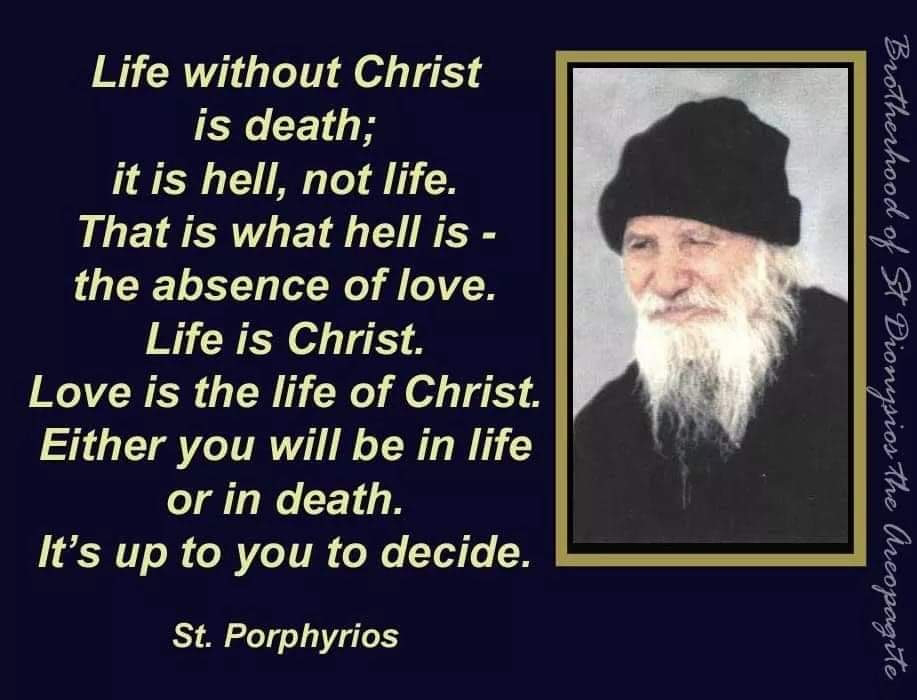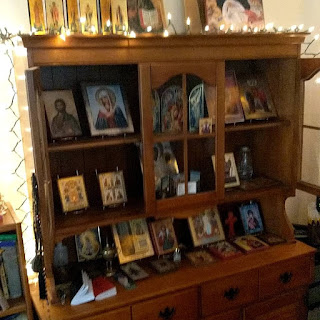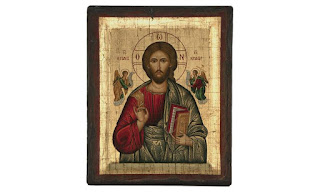We had a good meeting with our priest this afternoon. We saw Michael the homeless man in the parking lot and walked over to 7-11 and got him a cheeseburger and some chimichangas and a pack of smokes. It's getting colder and I am wondering where he is sleeping. There is a cold, metal balcony above the parking lot that we've seen his sleeping bag in-- which is good because there are rats in the parking lot. But I think if he slept outside this week he could freeze to death.
Father Paul gave us what he calls, "The Talk." He started with how Orthodoxy differs from Protestantism, some of which we already knew He told us that the Orthodox view of sin is that we turn away from Christ. Repentance is turning back toward Christ. Christ does not turn away from us. Our goal is to be in perfect harmony with Christ (which isn't really possible, of course, but one tries). He talked about the parable of the rich man. How does that start? It starts with the man calling Christ "good."
Mark 10:17-31
The Rich and the Kingdom of God
As Jesus started on his way, a man ran up to him and fell on his knees before him. “Good teacher,” he asked, “what must I do to inherit eternal life?”
“Why do you call me good?” Jesus answered. “No one is good—except God alone..."
So Christ, who IS God, says no one is good except for God.
Father Paul said, "You're going to want to be good Orthodox Christians. That is just setting yourself up for failure. You can't do it."
Then he talked about how we can't do it because we are too full of ourselves. He pulled a glass off the shelf and said, Imagine that this glass were full of dirt. Dirt is our selfishness and pride and sin. Christ told the Samaritan Woman at the well (St. Photini) in John 4:
Jesus answered, “Everyone who drinks this water will be thirsty again, but whoever drinks the water I give them will never thirst. Indeed, the water I give them will become in them a spring of water welling up to eternal life.”
But when our glass is already full of ourselves, how can we be filled with Christ? We can't. So what can we do? We can try to empty ourselves and allow room for Christ.
One day, we will all stand before God, and His light will either be warm or scalding. We are trying to become accustomed to the light now so we will receive it the way God intends.
But the thing is, Christ loves us so much that He won't force His grace on us. So, if we say, "Well, I only want 99% of You, because I am selfish and I would rather sleep for five more minutes than pray or love my neighbor or fast or {insert selfless act here}." So Christ will leave us our one percent of sin. Our dirt in the glass. And what happens when you add water to dirt? You get mud. And so we can never fully experience Grace as humans because we will always have some dirt in our glass.
But we can try to empty ourselves and have as much water in our cup as possible.
St. Paul says in Galatians 2:20:
"I have been crucified with Christ and I no longer live, but Christ lives in me. The life I now live in the body, I live by faith in the Son of God, who loved me and gave himself for me."
But St. Paul still uses the word, "I." Because we are still us. We are filled with Christ the more we empty ourselves. And what is Christ? Love.
At Catechumen class on Saturday, Father Justin told us that the Good Samaritan is Christ. He's a half-breed. He picks up the man and takes him to an inn. The inn is the church and the innkeeper is the priest. He tells the innkeeper to care for the man.
In the parable of the Prodigal Son, the boy's father sees the boy coming home because He has never turned away.
God never turns away. We can see this again and again in the scriptures.
Father Paul and Father Justin have also been talking about how the theology department should be housed with the medical school. Confession is about talking about how we have turned away from Christ and finding out ways to turn back to Him. Metanoia. Repentance. Turning back. It's not about punishment-- it's about healing.
Father Paul told us a very important theological concept: "From now on, you should have only two expectations of your spiritual life: First, you're going to suck at this. And second, when you fall, Christ will pick you up again."
Lastly, I saw this icon today:
St. Marina was such a cool saint. I love that image. More about her tomorrow.










